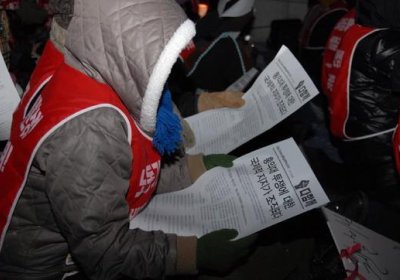About 60 stevedores and supporters gathered outside the headquarters of Shipping Australia in South Bank, Melbourne, on October 30 to demand that employers agree to introduce a national safety code in the industry.
Last month, 56-year-old Newcastle stevedore Greg Fitzgibbon was killed at work when he was crushed by a 20-tonne pallet. The day after this tragic death, the big stevedoring companies, led by employer organisation Shipping Australia, moved to block the introduction of a national code of safety on the waterfront.
Clive Tillman
Hundreds of armour-clad thugs from a private strikebreaking firm raided the site of a peaceful protest against a management-imposed lockout at the SJM car parts factory in Ansan, South Korea, on July 27.
Thirty four workers were injured and many were taken to hospital for treatment of serious injuries. The private strikebreakers were fitted in full riot gear with helmets, shields, sharp iron parts and meter long clubs. They sprayed fire extinguishers to obscure the workers' vision as they went on a club-weilding rampage.
More than 3000 riot police were sent to the Yoosung piston head factory in Asan on May 24 to break up a factory occupation and sit in protest over a company lockout.
Yoosung is a manufacturing company that has a near monopoly over the production of piston rings with an 80% share of the domestic market. It is a major supplier for Kia and Hyundai motors.
Despite years of anti-labour laws, government attacks on unions, workplace restructuring and labour “flexibility”, the huge turnout for 2011 May Day celebrations shows that South Korean organised labour is still a force to be reckoned with.
On May 1, huge numbers of workers took to the streets for May Day protests across Seoul. Police estimated the crowd at more than 58,000 — making it the largest 2011 May Day rally in Asia.
The main demands of the rally were for better workplace security and an end to the casualisation of labour.
Three former members of the left-wing student group Capitalism Research Society (CRC) were taken into police custody on March 21.
Among those arrested was the group’s former president Choi Ho-hyeon. They were charged under the National Security Act, a draconian anti-communist law that was enacted in 1948 during the height of bloody right-wing suppressions of popular grassroots democratic movements.
The law has been repeatedly used to crack down on political opposition and progressive movements.
Migrant Trade Union (MTU) president Michel Catuira is facing visa cancellation and possible deportation from South Korea.
On February 10, the Korean Immigration Service issued a number of measures against Catuira. These included the cancellation of his visa and a departure order to leave the country by March 7. It also threatened him with forcible deportation to his home country of the Philippines.
On January 3, 170 cleaners and security guards at Hongik University in Seoul were sacked for forming a union and demanding better conditions.
The workers formed a union on December 1 and demanded decent working conditions. Since their sacking, the workers have held a sit-in protest at the university campus — eating and sleeping on the cold, hard floors of the Munheon Building.
Hongik University is South Korea’s most famous university for visual arts. Many graduates are showing their support for the workers through their art work.
- Previous page
- Page 2



